NURSING Assignment: Ethical and Communication Strategies for Mrs. Wang
VerifiedAdded on 2022/08/16
|14
|4082
|16
Case Study
AI Summary
This assignment delves into the ethical complexities surrounding the care of Mrs. Wang, a patient facing end-of-life challenges. It examines critical ethical concepts such as autonomy, beneficence, and justice, alongside practical considerations like communication barriers and the importance of respecting cultural preferences. The analysis explores strategies for healthcare professionals to uphold Mrs. Wang's dignity, including language interpretation and sensitive communication regarding her condition. The case study emphasizes the role of nurses in providing compassionate care, maintaining effective communication with both the patient and her family, and navigating the challenges of palliative care, while also addressing the sensitive issue of disclosing information about her illness and treatment options. The assignment underscores the importance of advance directives and informed consent in ensuring patient autonomy and highlights the ethical obligation of healthcare providers to provide the best possible care while adhering to ethical and professional standards.
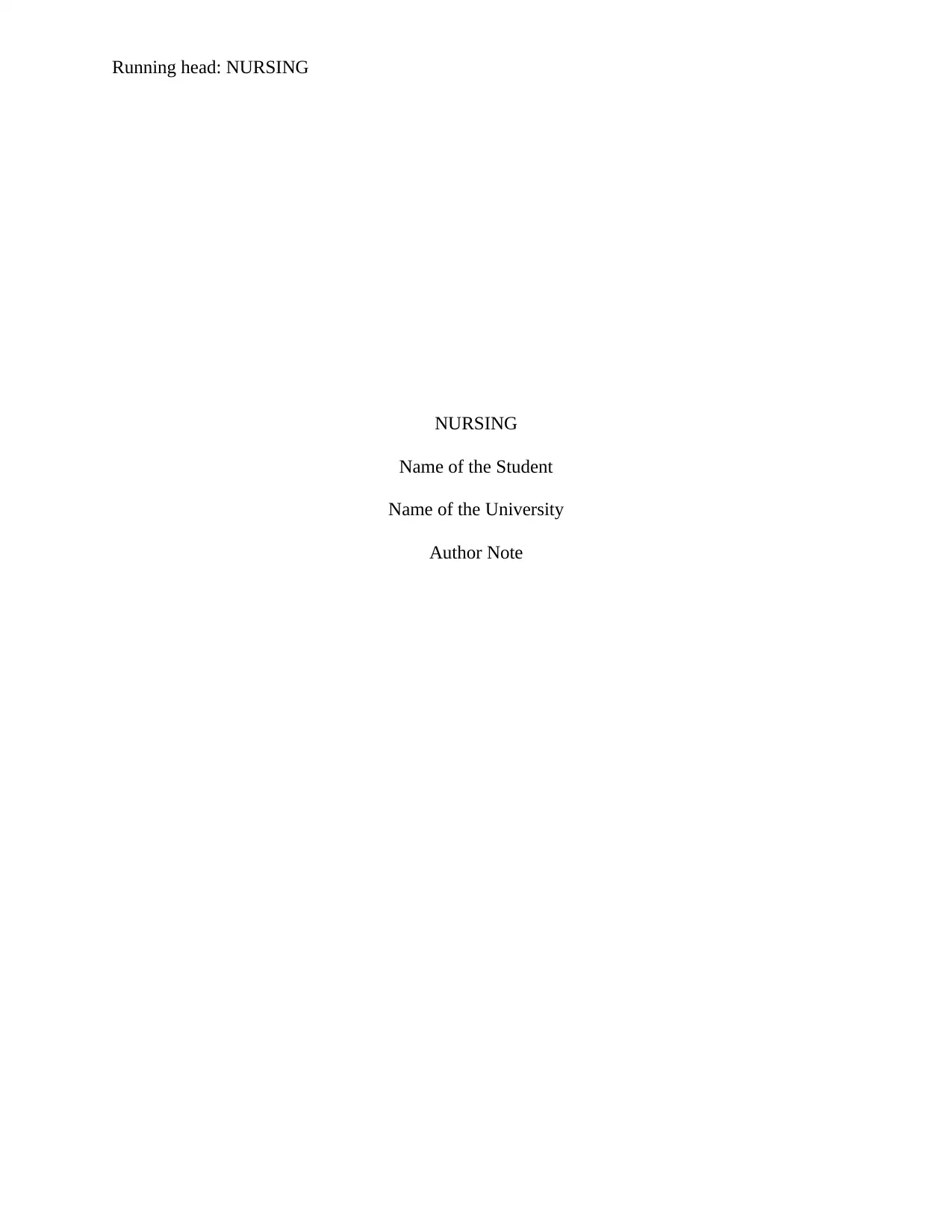
Running head: NURSING
NURSING
Name of the Student
Name of the University
Author Note
NURSING
Name of the Student
Name of the University
Author Note
Paraphrase This Document
Need a fresh take? Get an instant paraphrase of this document with our AI Paraphraser
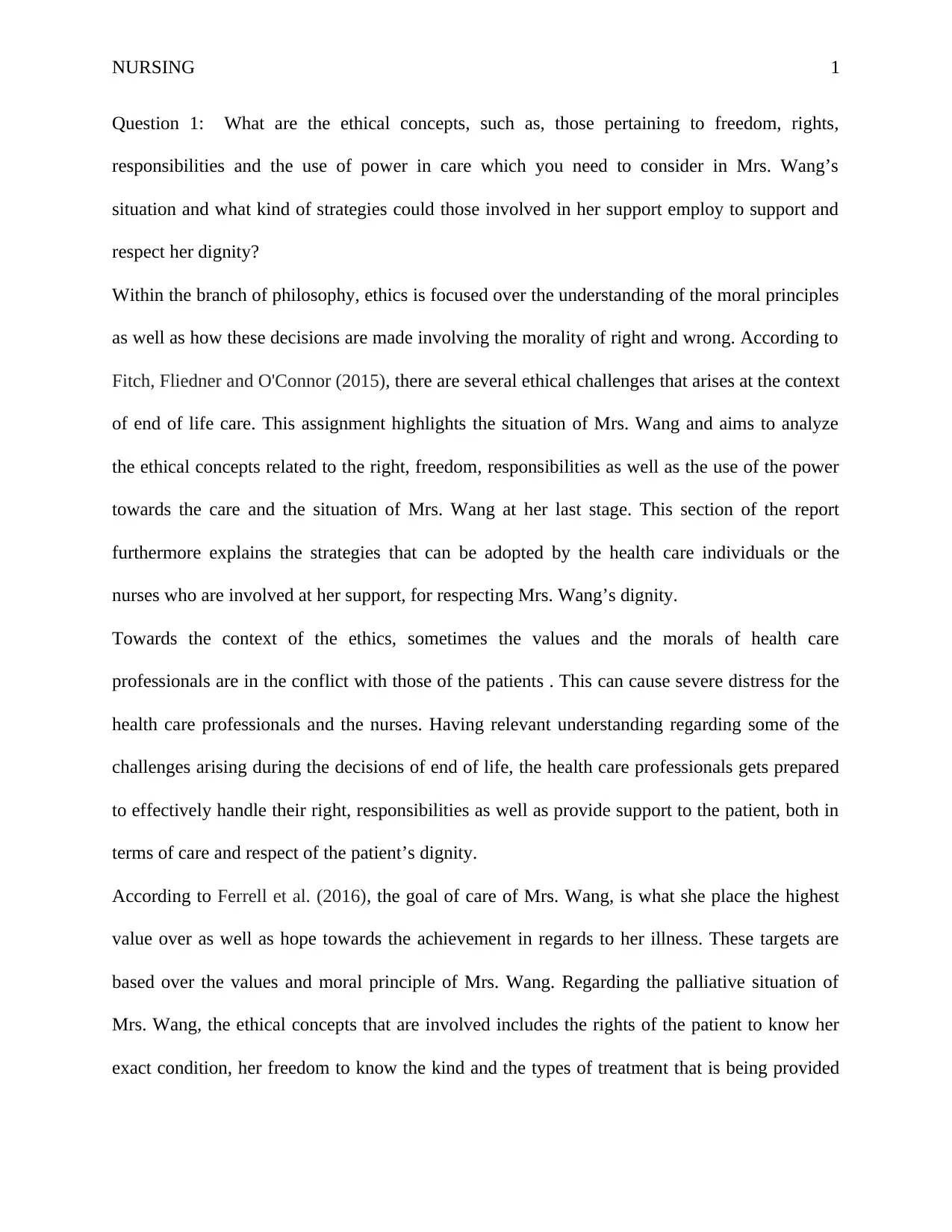
NURSING 1
Question 1: What are the ethical concepts, such as, those pertaining to freedom, rights,
responsibilities and the use of power in care which you need to consider in Mrs. Wang’s
situation and what kind of strategies could those involved in her support employ to support and
respect her dignity?
Within the branch of philosophy, ethics is focused over the understanding of the moral principles
as well as how these decisions are made involving the morality of right and wrong. According to
Fitch, Fliedner and O'Connor (2015), there are several ethical challenges that arises at the context
of end of life care. This assignment highlights the situation of Mrs. Wang and aims to analyze
the ethical concepts related to the right, freedom, responsibilities as well as the use of the power
towards the care and the situation of Mrs. Wang at her last stage. This section of the report
furthermore explains the strategies that can be adopted by the health care individuals or the
nurses who are involved at her support, for respecting Mrs. Wang’s dignity.
Towards the context of the ethics, sometimes the values and the morals of health care
professionals are in the conflict with those of the patients . This can cause severe distress for the
health care professionals and the nurses. Having relevant understanding regarding some of the
challenges arising during the decisions of end of life, the health care professionals gets prepared
to effectively handle their right, responsibilities as well as provide support to the patient, both in
terms of care and respect of the patient’s dignity.
According to Ferrell et al. (2016), the goal of care of Mrs. Wang, is what she place the highest
value over as well as hope towards the achievement in regards to her illness. These targets are
based over the values and moral principle of Mrs. Wang. Regarding the palliative situation of
Mrs. Wang, the ethical concepts that are involved includes the rights of the patient to know her
exact condition, her freedom to know the kind and the types of treatment that is being provided
Question 1: What are the ethical concepts, such as, those pertaining to freedom, rights,
responsibilities and the use of power in care which you need to consider in Mrs. Wang’s
situation and what kind of strategies could those involved in her support employ to support and
respect her dignity?
Within the branch of philosophy, ethics is focused over the understanding of the moral principles
as well as how these decisions are made involving the morality of right and wrong. According to
Fitch, Fliedner and O'Connor (2015), there are several ethical challenges that arises at the context
of end of life care. This assignment highlights the situation of Mrs. Wang and aims to analyze
the ethical concepts related to the right, freedom, responsibilities as well as the use of the power
towards the care and the situation of Mrs. Wang at her last stage. This section of the report
furthermore explains the strategies that can be adopted by the health care individuals or the
nurses who are involved at her support, for respecting Mrs. Wang’s dignity.
Towards the context of the ethics, sometimes the values and the morals of health care
professionals are in the conflict with those of the patients . This can cause severe distress for the
health care professionals and the nurses. Having relevant understanding regarding some of the
challenges arising during the decisions of end of life, the health care professionals gets prepared
to effectively handle their right, responsibilities as well as provide support to the patient, both in
terms of care and respect of the patient’s dignity.
According to Ferrell et al. (2016), the goal of care of Mrs. Wang, is what she place the highest
value over as well as hope towards the achievement in regards to her illness. These targets are
based over the values and moral principle of Mrs. Wang. Regarding the palliative situation of
Mrs. Wang, the ethical concepts that are involved includes the rights of the patient to know her
exact condition, her freedom to know the kind and the types of treatment that is being provided
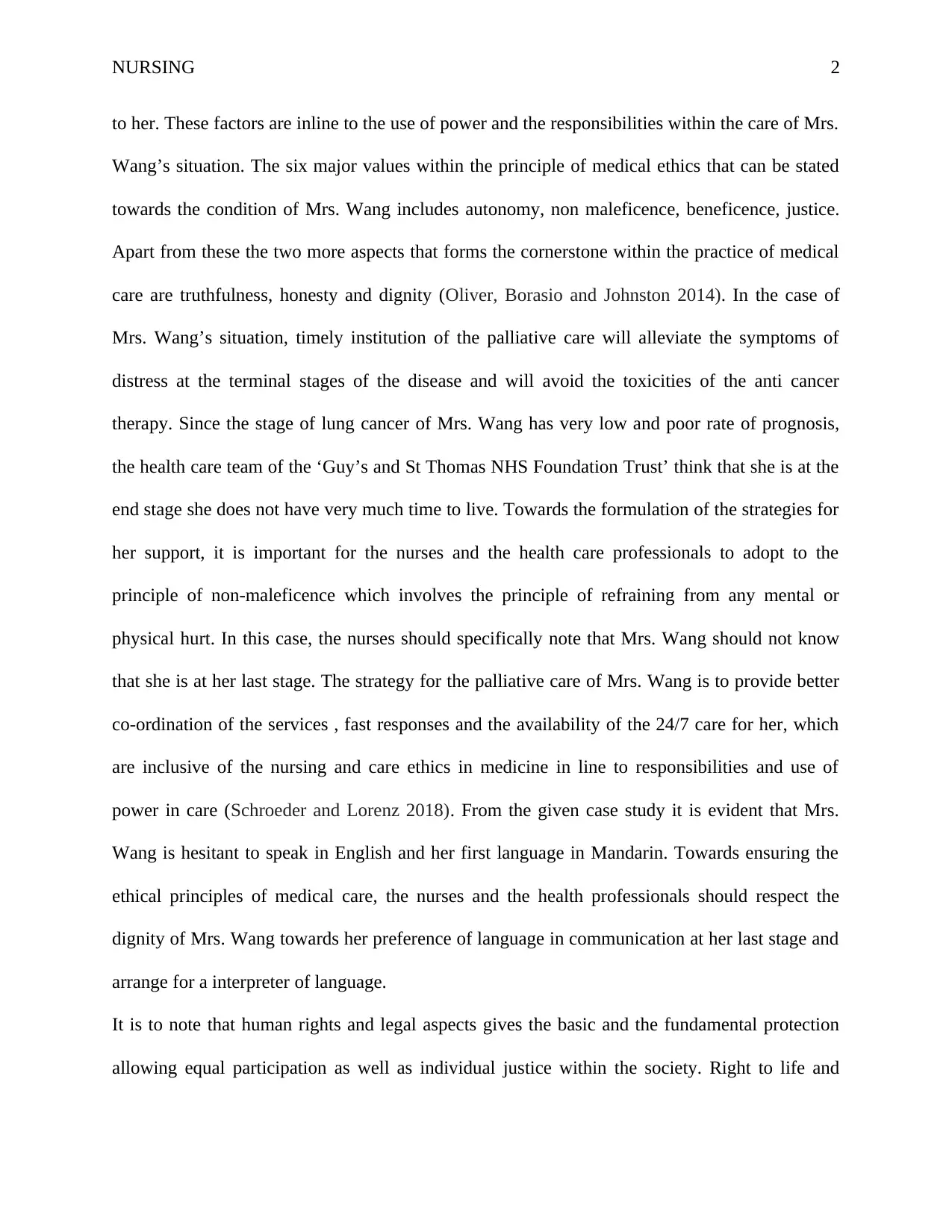
NURSING 2
to her. These factors are inline to the use of power and the responsibilities within the care of Mrs.
Wang’s situation. The six major values within the principle of medical ethics that can be stated
towards the condition of Mrs. Wang includes autonomy, non maleficence, beneficence, justice.
Apart from these the two more aspects that forms the cornerstone within the practice of medical
care are truthfulness, honesty and dignity (Oliver, Borasio and Johnston 2014). In the case of
Mrs. Wang’s situation, timely institution of the palliative care will alleviate the symptoms of
distress at the terminal stages of the disease and will avoid the toxicities of the anti cancer
therapy. Since the stage of lung cancer of Mrs. Wang has very low and poor rate of prognosis,
the health care team of the ‘Guy’s and St Thomas NHS Foundation Trust’ think that she is at the
end stage she does not have very much time to live. Towards the formulation of the strategies for
her support, it is important for the nurses and the health care professionals to adopt to the
principle of non-maleficence which involves the principle of refraining from any mental or
physical hurt. In this case, the nurses should specifically note that Mrs. Wang should not know
that she is at her last stage. The strategy for the palliative care of Mrs. Wang is to provide better
co-ordination of the services , fast responses and the availability of the 24/7 care for her, which
are inclusive of the nursing and care ethics in medicine in line to responsibilities and use of
power in care (Schroeder and Lorenz 2018). From the given case study it is evident that Mrs.
Wang is hesitant to speak in English and her first language in Mandarin. Towards ensuring the
ethical principles of medical care, the nurses and the health professionals should respect the
dignity of Mrs. Wang towards her preference of language in communication at her last stage and
arrange for a interpreter of language.
It is to note that human rights and legal aspects gives the basic and the fundamental protection
allowing equal participation as well as individual justice within the society. Right to life and
to her. These factors are inline to the use of power and the responsibilities within the care of Mrs.
Wang’s situation. The six major values within the principle of medical ethics that can be stated
towards the condition of Mrs. Wang includes autonomy, non maleficence, beneficence, justice.
Apart from these the two more aspects that forms the cornerstone within the practice of medical
care are truthfulness, honesty and dignity (Oliver, Borasio and Johnston 2014). In the case of
Mrs. Wang’s situation, timely institution of the palliative care will alleviate the symptoms of
distress at the terminal stages of the disease and will avoid the toxicities of the anti cancer
therapy. Since the stage of lung cancer of Mrs. Wang has very low and poor rate of prognosis,
the health care team of the ‘Guy’s and St Thomas NHS Foundation Trust’ think that she is at the
end stage she does not have very much time to live. Towards the formulation of the strategies for
her support, it is important for the nurses and the health care professionals to adopt to the
principle of non-maleficence which involves the principle of refraining from any mental or
physical hurt. In this case, the nurses should specifically note that Mrs. Wang should not know
that she is at her last stage. The strategy for the palliative care of Mrs. Wang is to provide better
co-ordination of the services , fast responses and the availability of the 24/7 care for her, which
are inclusive of the nursing and care ethics in medicine in line to responsibilities and use of
power in care (Schroeder and Lorenz 2018). From the given case study it is evident that Mrs.
Wang is hesitant to speak in English and her first language in Mandarin. Towards ensuring the
ethical principles of medical care, the nurses and the health professionals should respect the
dignity of Mrs. Wang towards her preference of language in communication at her last stage and
arrange for a interpreter of language.
It is to note that human rights and legal aspects gives the basic and the fundamental protection
allowing equal participation as well as individual justice within the society. Right to life and
⊘ This is a preview!⊘
Do you want full access?
Subscribe today to unlock all pages.

Trusted by 1+ million students worldwide
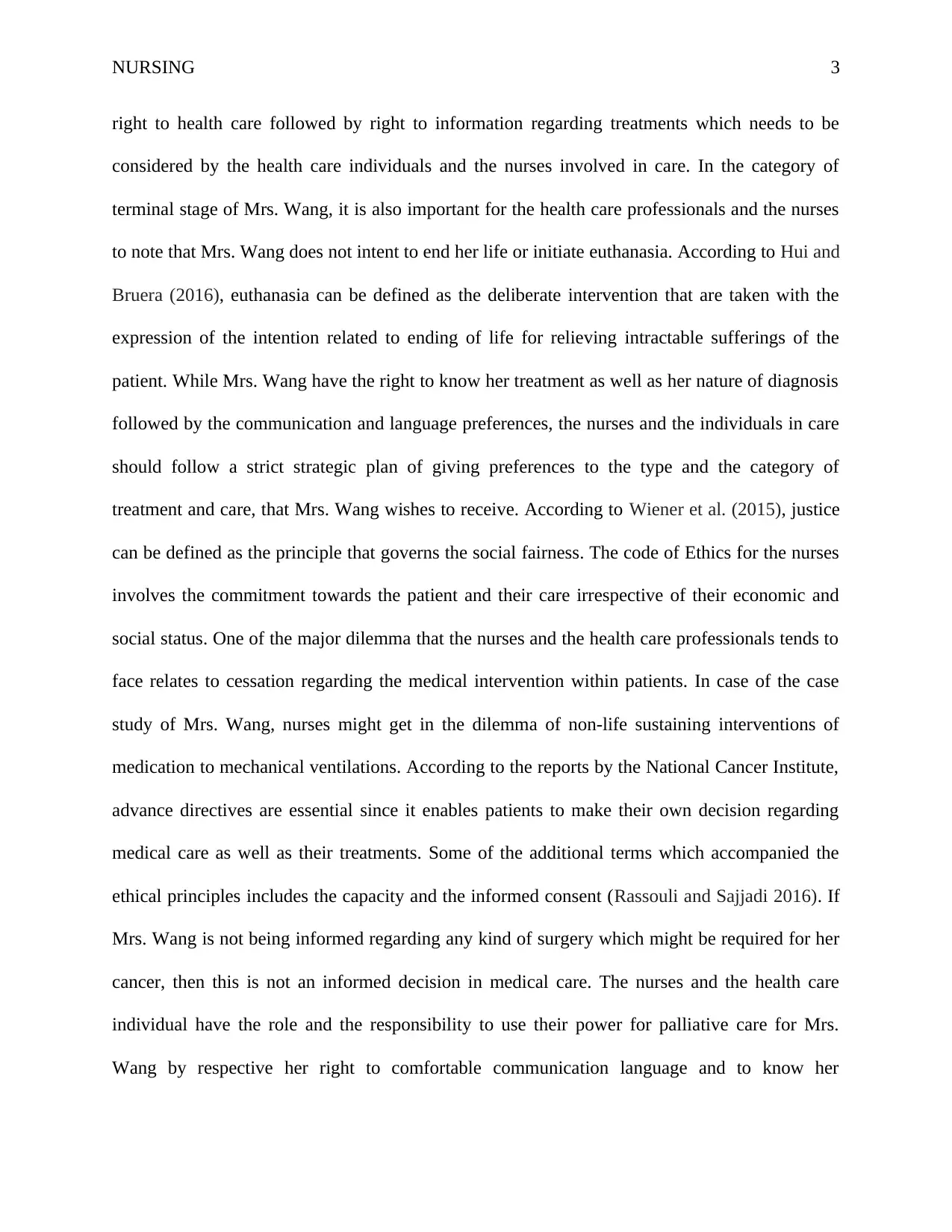
NURSING 3
right to health care followed by right to information regarding treatments which needs to be
considered by the health care individuals and the nurses involved in care. In the category of
terminal stage of Mrs. Wang, it is also important for the health care professionals and the nurses
to note that Mrs. Wang does not intent to end her life or initiate euthanasia. According to Hui and
Bruera (2016), euthanasia can be defined as the deliberate intervention that are taken with the
expression of the intention related to ending of life for relieving intractable sufferings of the
patient. While Mrs. Wang have the right to know her treatment as well as her nature of diagnosis
followed by the communication and language preferences, the nurses and the individuals in care
should follow a strict strategic plan of giving preferences to the type and the category of
treatment and care, that Mrs. Wang wishes to receive. According to Wiener et al. (2015), justice
can be defined as the principle that governs the social fairness. The code of Ethics for the nurses
involves the commitment towards the patient and their care irrespective of their economic and
social status. One of the major dilemma that the nurses and the health care professionals tends to
face relates to cessation regarding the medical intervention within patients. In case of the case
study of Mrs. Wang, nurses might get in the dilemma of non-life sustaining interventions of
medication to mechanical ventilations. According to the reports by the National Cancer Institute,
advance directives are essential since it enables patients to make their own decision regarding
medical care as well as their treatments. Some of the additional terms which accompanied the
ethical principles includes the capacity and the informed consent (Rassouli and Sajjadi 2016). If
Mrs. Wang is not being informed regarding any kind of surgery which might be required for her
cancer, then this is not an informed decision in medical care. The nurses and the health care
individual have the role and the responsibility to use their power for palliative care for Mrs.
Wang by respective her right to comfortable communication language and to know her
right to health care followed by right to information regarding treatments which needs to be
considered by the health care individuals and the nurses involved in care. In the category of
terminal stage of Mrs. Wang, it is also important for the health care professionals and the nurses
to note that Mrs. Wang does not intent to end her life or initiate euthanasia. According to Hui and
Bruera (2016), euthanasia can be defined as the deliberate intervention that are taken with the
expression of the intention related to ending of life for relieving intractable sufferings of the
patient. While Mrs. Wang have the right to know her treatment as well as her nature of diagnosis
followed by the communication and language preferences, the nurses and the individuals in care
should follow a strict strategic plan of giving preferences to the type and the category of
treatment and care, that Mrs. Wang wishes to receive. According to Wiener et al. (2015), justice
can be defined as the principle that governs the social fairness. The code of Ethics for the nurses
involves the commitment towards the patient and their care irrespective of their economic and
social status. One of the major dilemma that the nurses and the health care professionals tends to
face relates to cessation regarding the medical intervention within patients. In case of the case
study of Mrs. Wang, nurses might get in the dilemma of non-life sustaining interventions of
medication to mechanical ventilations. According to the reports by the National Cancer Institute,
advance directives are essential since it enables patients to make their own decision regarding
medical care as well as their treatments. Some of the additional terms which accompanied the
ethical principles includes the capacity and the informed consent (Rassouli and Sajjadi 2016). If
Mrs. Wang is not being informed regarding any kind of surgery which might be required for her
cancer, then this is not an informed decision in medical care. The nurses and the health care
individual have the role and the responsibility to use their power for palliative care for Mrs.
Wang by respective her right to comfortable communication language and to know her
Paraphrase This Document
Need a fresh take? Get an instant paraphrase of this document with our AI Paraphraser
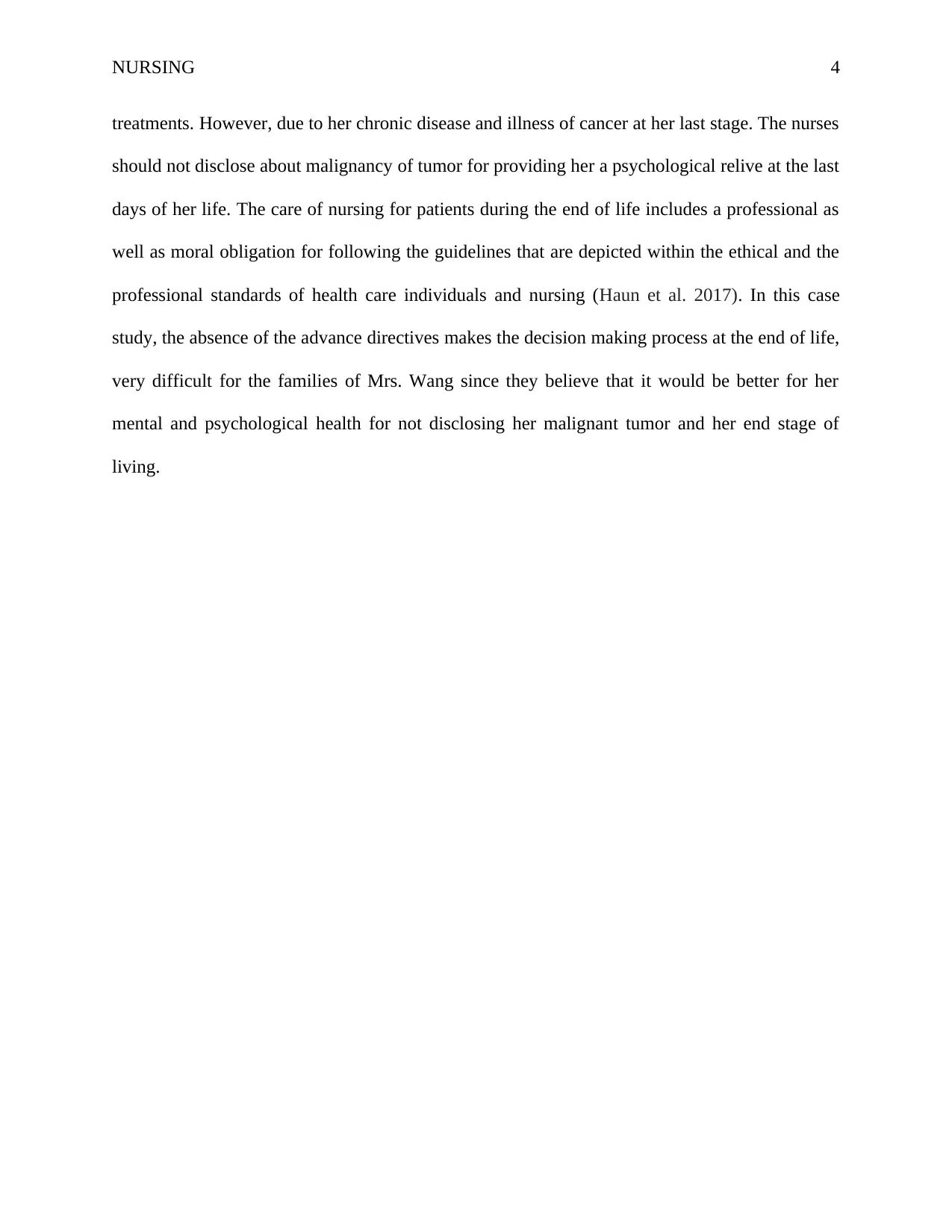
NURSING 4
treatments. However, due to her chronic disease and illness of cancer at her last stage. The nurses
should not disclose about malignancy of tumor for providing her a psychological relive at the last
days of her life. The care of nursing for patients during the end of life includes a professional as
well as moral obligation for following the guidelines that are depicted within the ethical and the
professional standards of health care individuals and nursing (Haun et al. 2017). In this case
study, the absence of the advance directives makes the decision making process at the end of life,
very difficult for the families of Mrs. Wang since they believe that it would be better for her
mental and psychological health for not disclosing her malignant tumor and her end stage of
living.
treatments. However, due to her chronic disease and illness of cancer at her last stage. The nurses
should not disclose about malignancy of tumor for providing her a psychological relive at the last
days of her life. The care of nursing for patients during the end of life includes a professional as
well as moral obligation for following the guidelines that are depicted within the ethical and the
professional standards of health care individuals and nursing (Haun et al. 2017). In this case
study, the absence of the advance directives makes the decision making process at the end of life,
very difficult for the families of Mrs. Wang since they believe that it would be better for her
mental and psychological health for not disclosing her malignant tumor and her end stage of
living.
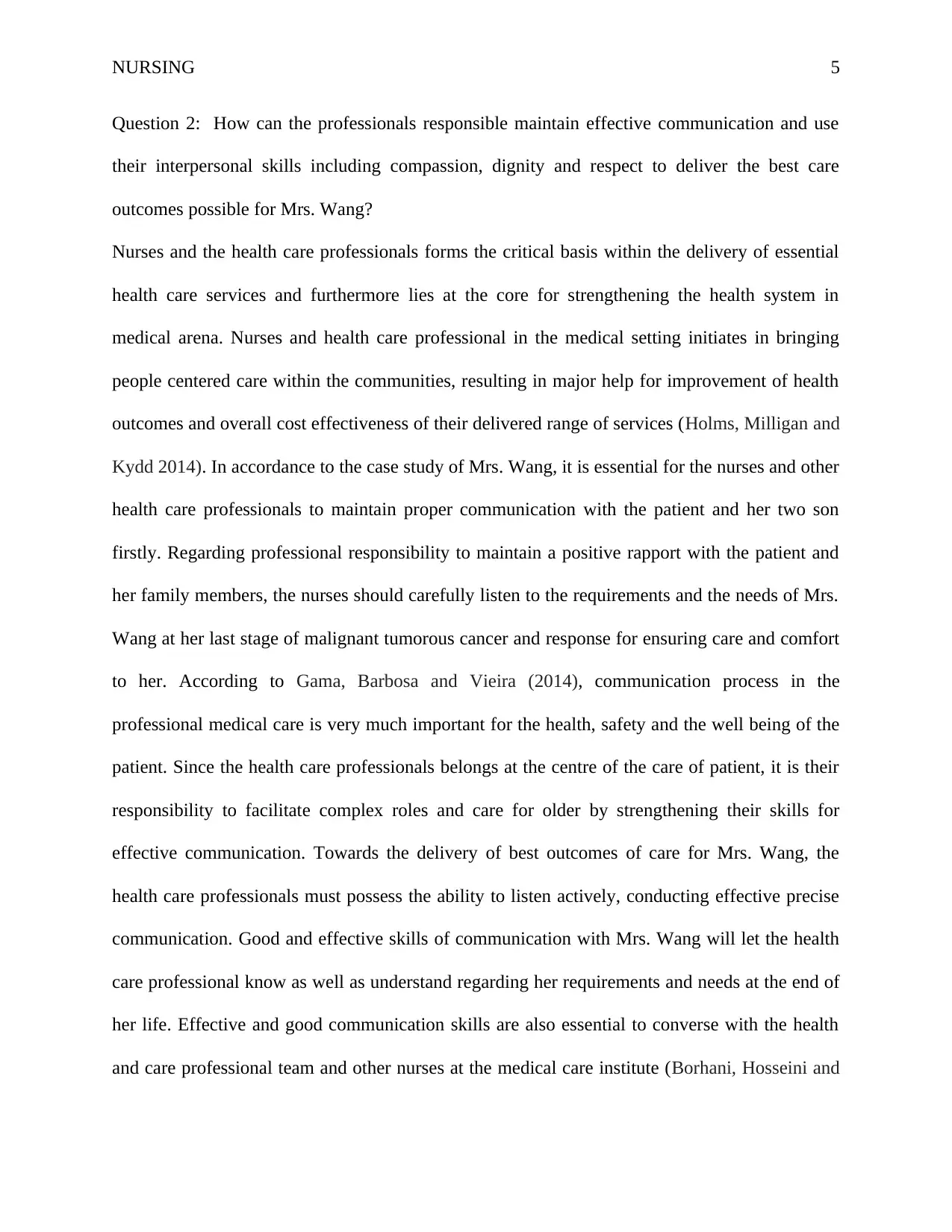
NURSING 5
Question 2: How can the professionals responsible maintain effective communication and use
their interpersonal skills including compassion, dignity and respect to deliver the best care
outcomes possible for Mrs. Wang?
Nurses and the health care professionals forms the critical basis within the delivery of essential
health care services and furthermore lies at the core for strengthening the health system in
medical arena. Nurses and health care professional in the medical setting initiates in bringing
people centered care within the communities, resulting in major help for improvement of health
outcomes and overall cost effectiveness of their delivered range of services (Holms, Milligan and
Kydd 2014). In accordance to the case study of Mrs. Wang, it is essential for the nurses and other
health care professionals to maintain proper communication with the patient and her two son
firstly. Regarding professional responsibility to maintain a positive rapport with the patient and
her family members, the nurses should carefully listen to the requirements and the needs of Mrs.
Wang at her last stage of malignant tumorous cancer and response for ensuring care and comfort
to her. According to Gama, Barbosa and Vieira (2014), communication process in the
professional medical care is very much important for the health, safety and the well being of the
patient. Since the health care professionals belongs at the centre of the care of patient, it is their
responsibility to facilitate complex roles and care for older by strengthening their skills for
effective communication. Towards the delivery of best outcomes of care for Mrs. Wang, the
health care professionals must possess the ability to listen actively, conducting effective precise
communication. Good and effective skills of communication with Mrs. Wang will let the health
care professional know as well as understand regarding her requirements and needs at the end of
her life. Effective and good communication skills are also essential to converse with the health
and care professional team and other nurses at the medical care institute (Borhani, Hosseini and
Question 2: How can the professionals responsible maintain effective communication and use
their interpersonal skills including compassion, dignity and respect to deliver the best care
outcomes possible for Mrs. Wang?
Nurses and the health care professionals forms the critical basis within the delivery of essential
health care services and furthermore lies at the core for strengthening the health system in
medical arena. Nurses and health care professional in the medical setting initiates in bringing
people centered care within the communities, resulting in major help for improvement of health
outcomes and overall cost effectiveness of their delivered range of services (Holms, Milligan and
Kydd 2014). In accordance to the case study of Mrs. Wang, it is essential for the nurses and other
health care professionals to maintain proper communication with the patient and her two son
firstly. Regarding professional responsibility to maintain a positive rapport with the patient and
her family members, the nurses should carefully listen to the requirements and the needs of Mrs.
Wang at her last stage of malignant tumorous cancer and response for ensuring care and comfort
to her. According to Gama, Barbosa and Vieira (2014), communication process in the
professional medical care is very much important for the health, safety and the well being of the
patient. Since the health care professionals belongs at the centre of the care of patient, it is their
responsibility to facilitate complex roles and care for older by strengthening their skills for
effective communication. Towards the delivery of best outcomes of care for Mrs. Wang, the
health care professionals must possess the ability to listen actively, conducting effective precise
communication. Good and effective skills of communication with Mrs. Wang will let the health
care professional know as well as understand regarding her requirements and needs at the end of
her life. Effective and good communication skills are also essential to converse with the health
and care professional team and other nurses at the medical care institute (Borhani, Hosseini and
⊘ This is a preview!⊘
Do you want full access?
Subscribe today to unlock all pages.

Trusted by 1+ million students worldwide
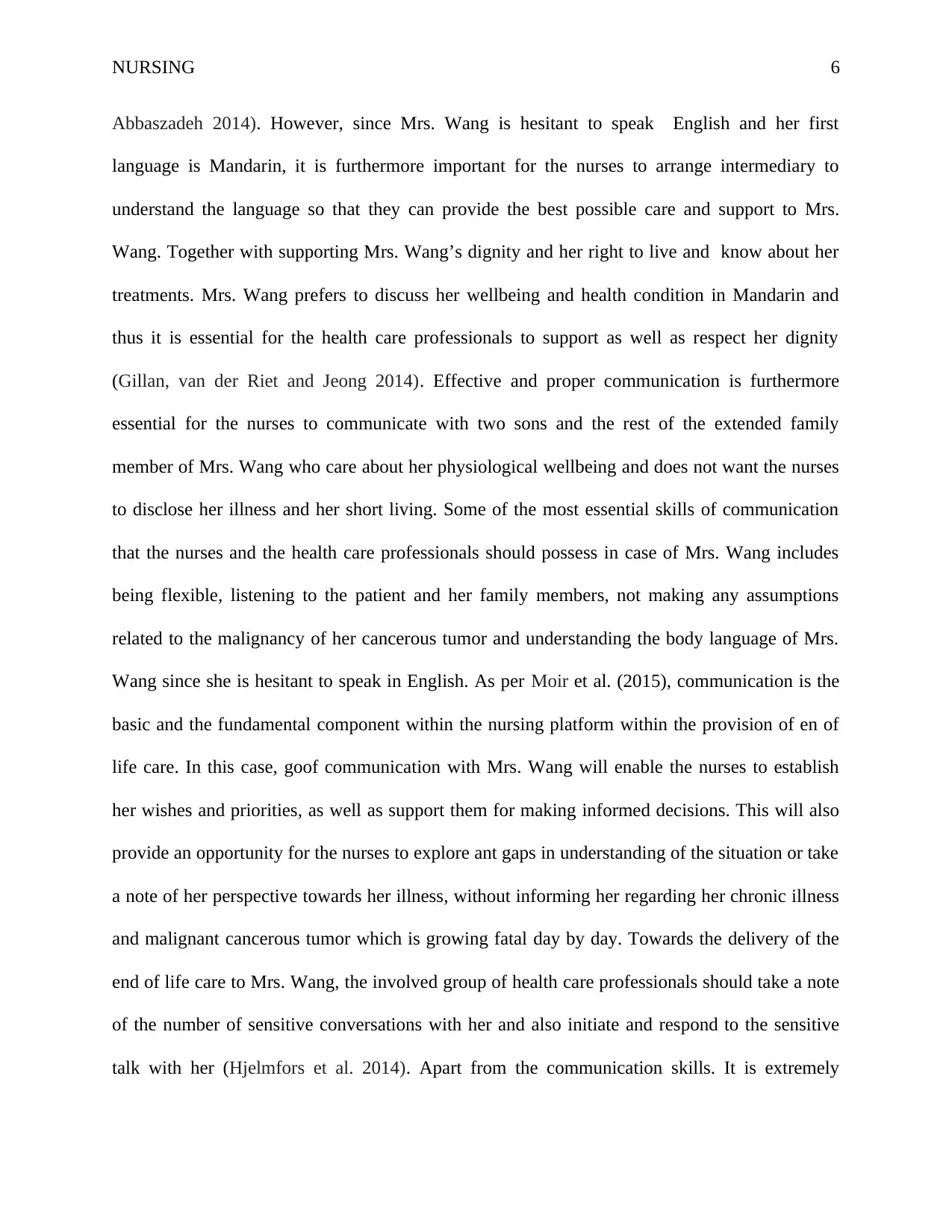
NURSING 6
Abbaszadeh 2014). However, since Mrs. Wang is hesitant to speak English and her first
language is Mandarin, it is furthermore important for the nurses to arrange intermediary to
understand the language so that they can provide the best possible care and support to Mrs.
Wang. Together with supporting Mrs. Wang’s dignity and her right to live and know about her
treatments. Mrs. Wang prefers to discuss her wellbeing and health condition in Mandarin and
thus it is essential for the health care professionals to support as well as respect her dignity
(Gillan, van der Riet and Jeong 2014). Effective and proper communication is furthermore
essential for the nurses to communicate with two sons and the rest of the extended family
member of Mrs. Wang who care about her physiological wellbeing and does not want the nurses
to disclose her illness and her short living. Some of the most essential skills of communication
that the nurses and the health care professionals should possess in case of Mrs. Wang includes
being flexible, listening to the patient and her family members, not making any assumptions
related to the malignancy of her cancerous tumor and understanding the body language of Mrs.
Wang since she is hesitant to speak in English. As per Moir et al. (2015), communication is the
basic and the fundamental component within the nursing platform within the provision of en of
life care. In this case, goof communication with Mrs. Wang will enable the nurses to establish
her wishes and priorities, as well as support them for making informed decisions. This will also
provide an opportunity for the nurses to explore ant gaps in understanding of the situation or take
a note of her perspective towards her illness, without informing her regarding her chronic illness
and malignant cancerous tumor which is growing fatal day by day. Towards the delivery of the
end of life care to Mrs. Wang, the involved group of health care professionals should take a note
of the number of sensitive conversations with her and also initiate and respond to the sensitive
talk with her (Hjelmfors et al. 2014). Apart from the communication skills. It is extremely
Abbaszadeh 2014). However, since Mrs. Wang is hesitant to speak English and her first
language is Mandarin, it is furthermore important for the nurses to arrange intermediary to
understand the language so that they can provide the best possible care and support to Mrs.
Wang. Together with supporting Mrs. Wang’s dignity and her right to live and know about her
treatments. Mrs. Wang prefers to discuss her wellbeing and health condition in Mandarin and
thus it is essential for the health care professionals to support as well as respect her dignity
(Gillan, van der Riet and Jeong 2014). Effective and proper communication is furthermore
essential for the nurses to communicate with two sons and the rest of the extended family
member of Mrs. Wang who care about her physiological wellbeing and does not want the nurses
to disclose her illness and her short living. Some of the most essential skills of communication
that the nurses and the health care professionals should possess in case of Mrs. Wang includes
being flexible, listening to the patient and her family members, not making any assumptions
related to the malignancy of her cancerous tumor and understanding the body language of Mrs.
Wang since she is hesitant to speak in English. As per Moir et al. (2015), communication is the
basic and the fundamental component within the nursing platform within the provision of en of
life care. In this case, goof communication with Mrs. Wang will enable the nurses to establish
her wishes and priorities, as well as support them for making informed decisions. This will also
provide an opportunity for the nurses to explore ant gaps in understanding of the situation or take
a note of her perspective towards her illness, without informing her regarding her chronic illness
and malignant cancerous tumor which is growing fatal day by day. Towards the delivery of the
end of life care to Mrs. Wang, the involved group of health care professionals should take a note
of the number of sensitive conversations with her and also initiate and respond to the sensitive
talk with her (Hjelmfors et al. 2014). Apart from the communication skills. It is extremely
Paraphrase This Document
Need a fresh take? Get an instant paraphrase of this document with our AI Paraphraser
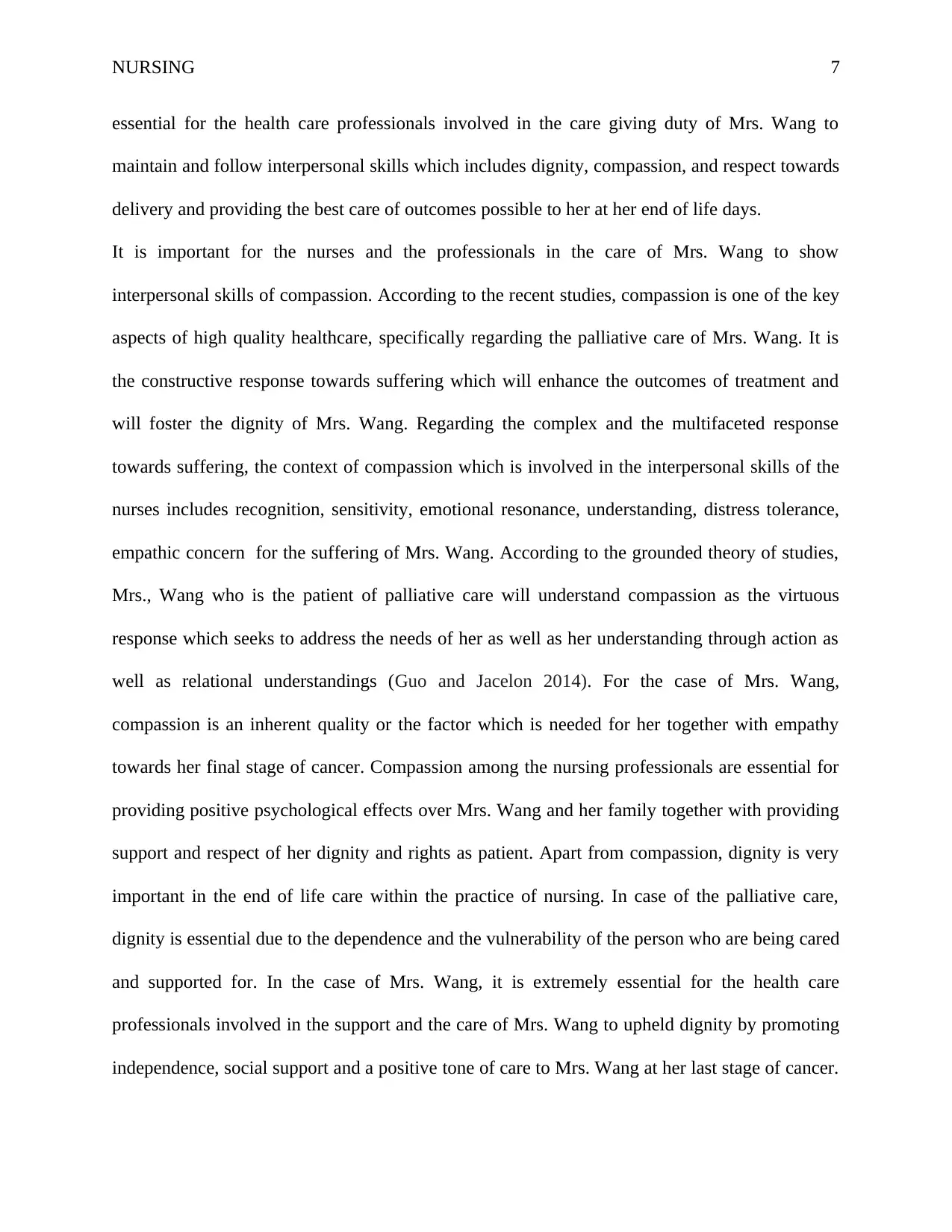
NURSING 7
essential for the health care professionals involved in the care giving duty of Mrs. Wang to
maintain and follow interpersonal skills which includes dignity, compassion, and respect towards
delivery and providing the best care of outcomes possible to her at her end of life days.
It is important for the nurses and the professionals in the care of Mrs. Wang to show
interpersonal skills of compassion. According to the recent studies, compassion is one of the key
aspects of high quality healthcare, specifically regarding the palliative care of Mrs. Wang. It is
the constructive response towards suffering which will enhance the outcomes of treatment and
will foster the dignity of Mrs. Wang. Regarding the complex and the multifaceted response
towards suffering, the context of compassion which is involved in the interpersonal skills of the
nurses includes recognition, sensitivity, emotional resonance, understanding, distress tolerance,
empathic concern for the suffering of Mrs. Wang. According to the grounded theory of studies,
Mrs., Wang who is the patient of palliative care will understand compassion as the virtuous
response which seeks to address the needs of her as well as her understanding through action as
well as relational understandings (Guo and Jacelon 2014). For the case of Mrs. Wang,
compassion is an inherent quality or the factor which is needed for her together with empathy
towards her final stage of cancer. Compassion among the nursing professionals are essential for
providing positive psychological effects over Mrs. Wang and her family together with providing
support and respect of her dignity and rights as patient. Apart from compassion, dignity is very
important in the end of life care within the practice of nursing. In case of the palliative care,
dignity is essential due to the dependence and the vulnerability of the person who are being cared
and supported for. In the case of Mrs. Wang, it is extremely essential for the health care
professionals involved in the support and the care of Mrs. Wang to upheld dignity by promoting
independence, social support and a positive tone of care to Mrs. Wang at her last stage of cancer.
essential for the health care professionals involved in the care giving duty of Mrs. Wang to
maintain and follow interpersonal skills which includes dignity, compassion, and respect towards
delivery and providing the best care of outcomes possible to her at her end of life days.
It is important for the nurses and the professionals in the care of Mrs. Wang to show
interpersonal skills of compassion. According to the recent studies, compassion is one of the key
aspects of high quality healthcare, specifically regarding the palliative care of Mrs. Wang. It is
the constructive response towards suffering which will enhance the outcomes of treatment and
will foster the dignity of Mrs. Wang. Regarding the complex and the multifaceted response
towards suffering, the context of compassion which is involved in the interpersonal skills of the
nurses includes recognition, sensitivity, emotional resonance, understanding, distress tolerance,
empathic concern for the suffering of Mrs. Wang. According to the grounded theory of studies,
Mrs., Wang who is the patient of palliative care will understand compassion as the virtuous
response which seeks to address the needs of her as well as her understanding through action as
well as relational understandings (Guo and Jacelon 2014). For the case of Mrs. Wang,
compassion is an inherent quality or the factor which is needed for her together with empathy
towards her final stage of cancer. Compassion among the nursing professionals are essential for
providing positive psychological effects over Mrs. Wang and her family together with providing
support and respect of her dignity and rights as patient. Apart from compassion, dignity is very
important in the end of life care within the practice of nursing. In case of the palliative care,
dignity is essential due to the dependence and the vulnerability of the person who are being cared
and supported for. In the case of Mrs. Wang, it is extremely essential for the health care
professionals involved in the support and the care of Mrs. Wang to upheld dignity by promoting
independence, social support and a positive tone of care to Mrs. Wang at her last stage of cancer.
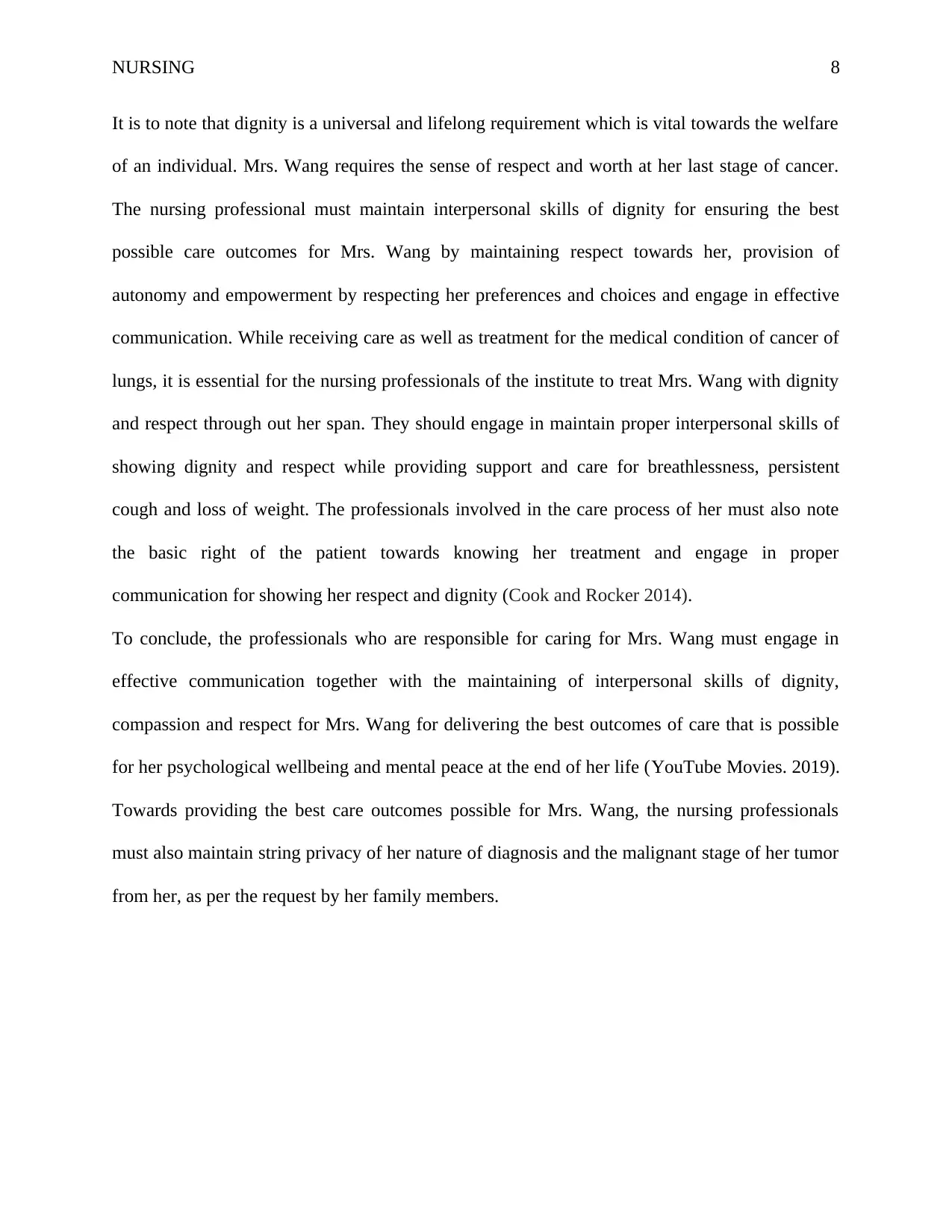
NURSING 8
It is to note that dignity is a universal and lifelong requirement which is vital towards the welfare
of an individual. Mrs. Wang requires the sense of respect and worth at her last stage of cancer.
The nursing professional must maintain interpersonal skills of dignity for ensuring the best
possible care outcomes for Mrs. Wang by maintaining respect towards her, provision of
autonomy and empowerment by respecting her preferences and choices and engage in effective
communication. While receiving care as well as treatment for the medical condition of cancer of
lungs, it is essential for the nursing professionals of the institute to treat Mrs. Wang with dignity
and respect through out her span. They should engage in maintain proper interpersonal skills of
showing dignity and respect while providing support and care for breathlessness, persistent
cough and loss of weight. The professionals involved in the care process of her must also note
the basic right of the patient towards knowing her treatment and engage in proper
communication for showing her respect and dignity (Cook and Rocker 2014).
To conclude, the professionals who are responsible for caring for Mrs. Wang must engage in
effective communication together with the maintaining of interpersonal skills of dignity,
compassion and respect for Mrs. Wang for delivering the best outcomes of care that is possible
for her psychological wellbeing and mental peace at the end of her life (YouTube Movies. 2019).
Towards providing the best care outcomes possible for Mrs. Wang, the nursing professionals
must also maintain string privacy of her nature of diagnosis and the malignant stage of her tumor
from her, as per the request by her family members.
It is to note that dignity is a universal and lifelong requirement which is vital towards the welfare
of an individual. Mrs. Wang requires the sense of respect and worth at her last stage of cancer.
The nursing professional must maintain interpersonal skills of dignity for ensuring the best
possible care outcomes for Mrs. Wang by maintaining respect towards her, provision of
autonomy and empowerment by respecting her preferences and choices and engage in effective
communication. While receiving care as well as treatment for the medical condition of cancer of
lungs, it is essential for the nursing professionals of the institute to treat Mrs. Wang with dignity
and respect through out her span. They should engage in maintain proper interpersonal skills of
showing dignity and respect while providing support and care for breathlessness, persistent
cough and loss of weight. The professionals involved in the care process of her must also note
the basic right of the patient towards knowing her treatment and engage in proper
communication for showing her respect and dignity (Cook and Rocker 2014).
To conclude, the professionals who are responsible for caring for Mrs. Wang must engage in
effective communication together with the maintaining of interpersonal skills of dignity,
compassion and respect for Mrs. Wang for delivering the best outcomes of care that is possible
for her psychological wellbeing and mental peace at the end of her life (YouTube Movies. 2019).
Towards providing the best care outcomes possible for Mrs. Wang, the nursing professionals
must also maintain string privacy of her nature of diagnosis and the malignant stage of her tumor
from her, as per the request by her family members.
⊘ This is a preview!⊘
Do you want full access?
Subscribe today to unlock all pages.

Trusted by 1+ million students worldwide
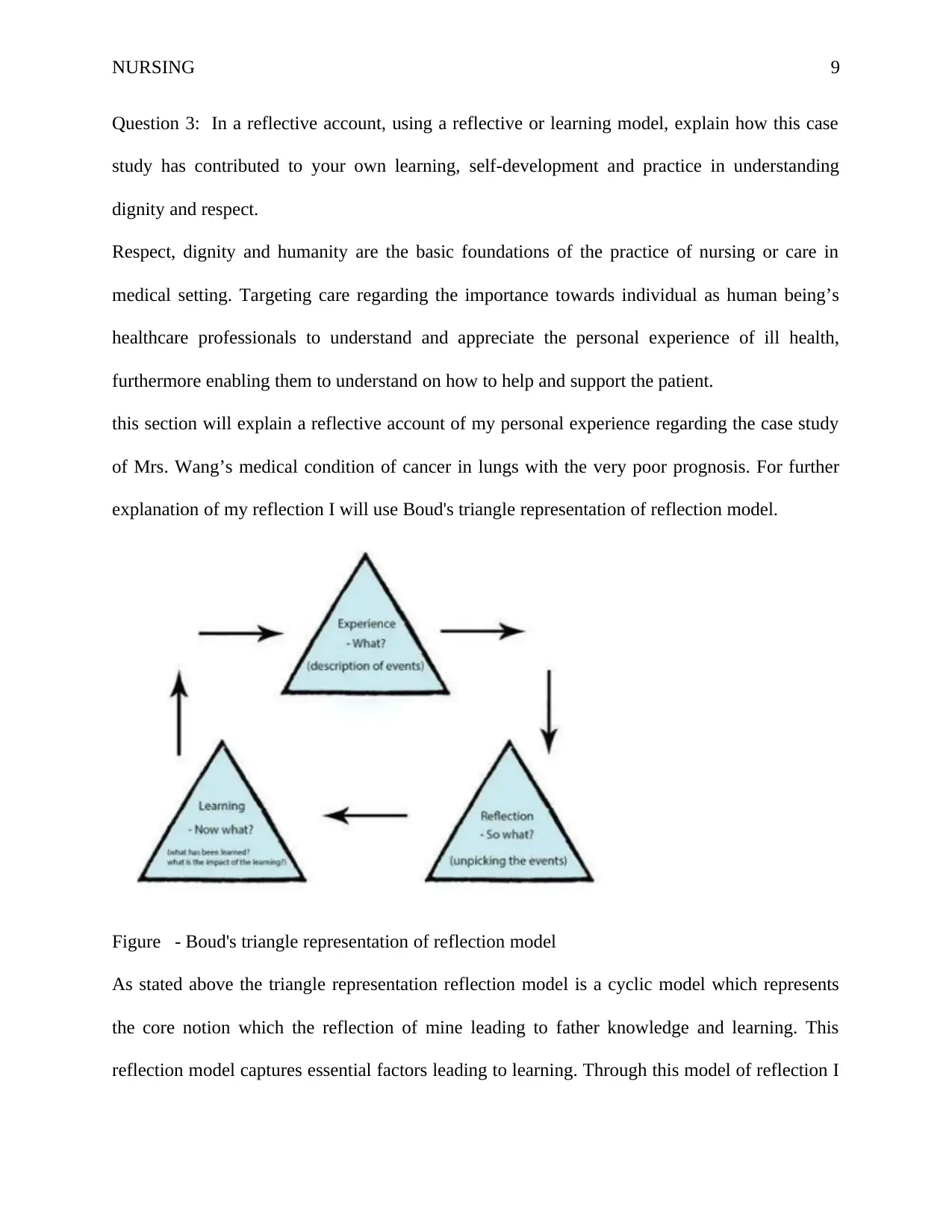
NURSING 9
Question 3: In a reflective account, using a reflective or learning model, explain how this case
study has contributed to your own learning, self-development and practice in understanding
dignity and respect.
Respect, dignity and humanity are the basic foundations of the practice of nursing or care in
medical setting. Targeting care regarding the importance towards individual as human being’s
healthcare professionals to understand and appreciate the personal experience of ill health,
furthermore enabling them to understand on how to help and support the patient.
this section will explain a reflective account of my personal experience regarding the case study
of Mrs. Wang’s medical condition of cancer in lungs with the very poor prognosis. For further
explanation of my reflection I will use Boud's triangle representation of reflection model.
Figure - Boud's triangle representation of reflection model
As stated above the triangle representation reflection model is a cyclic model which represents
the core notion which the reflection of mine leading to father knowledge and learning. This
reflection model captures essential factors leading to learning. Through this model of reflection I
Question 3: In a reflective account, using a reflective or learning model, explain how this case
study has contributed to your own learning, self-development and practice in understanding
dignity and respect.
Respect, dignity and humanity are the basic foundations of the practice of nursing or care in
medical setting. Targeting care regarding the importance towards individual as human being’s
healthcare professionals to understand and appreciate the personal experience of ill health,
furthermore enabling them to understand on how to help and support the patient.
this section will explain a reflective account of my personal experience regarding the case study
of Mrs. Wang’s medical condition of cancer in lungs with the very poor prognosis. For further
explanation of my reflection I will use Boud's triangle representation of reflection model.
Figure - Boud's triangle representation of reflection model
As stated above the triangle representation reflection model is a cyclic model which represents
the core notion which the reflection of mine leading to father knowledge and learning. This
reflection model captures essential factors leading to learning. Through this model of reflection I
Paraphrase This Document
Need a fresh take? Get an instant paraphrase of this document with our AI Paraphraser
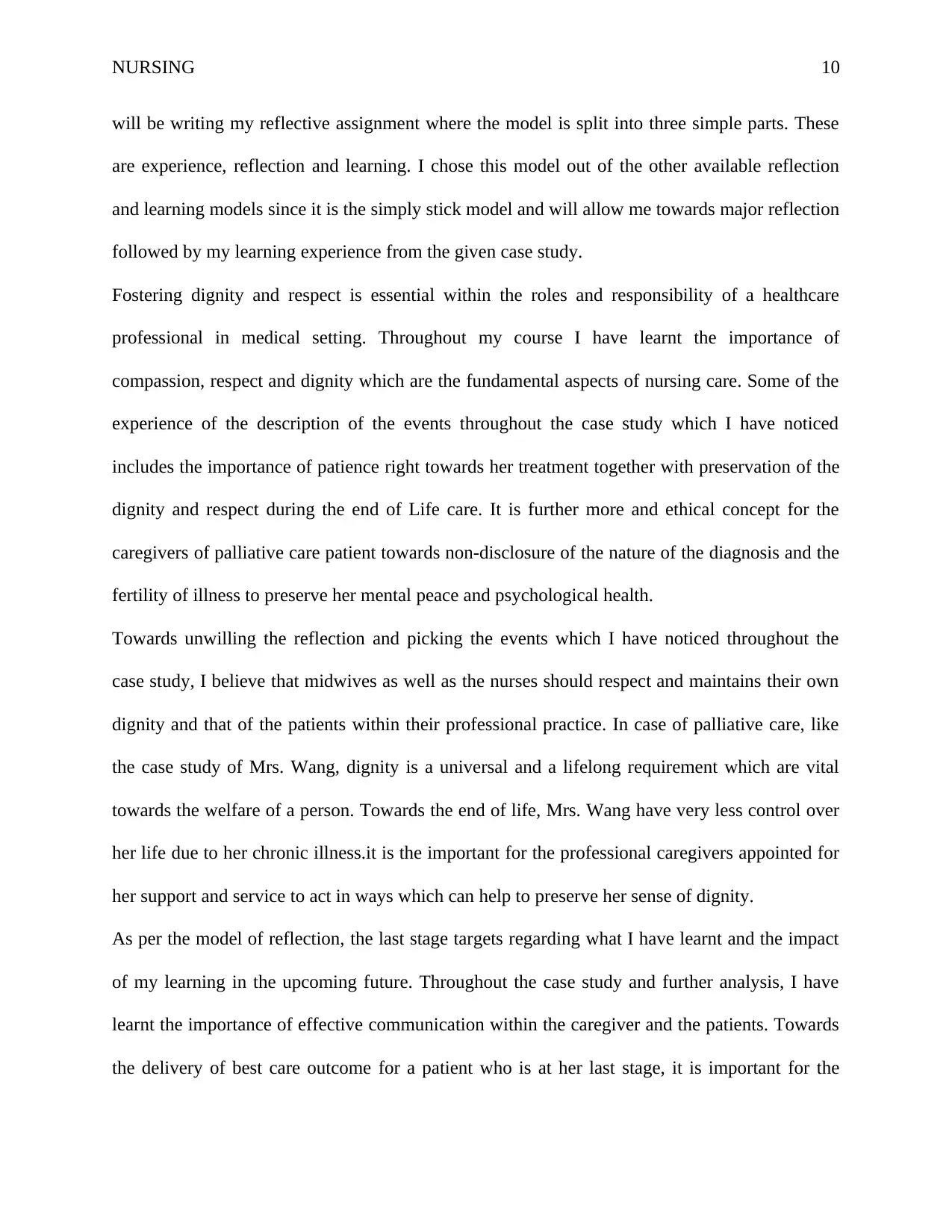
NURSING 10
will be writing my reflective assignment where the model is split into three simple parts. These
are experience, reflection and learning. I chose this model out of the other available reflection
and learning models since it is the simply stick model and will allow me towards major reflection
followed by my learning experience from the given case study.
Fostering dignity and respect is essential within the roles and responsibility of a healthcare
professional in medical setting. Throughout my course I have learnt the importance of
compassion, respect and dignity which are the fundamental aspects of nursing care. Some of the
experience of the description of the events throughout the case study which I have noticed
includes the importance of patience right towards her treatment together with preservation of the
dignity and respect during the end of Life care. It is further more and ethical concept for the
caregivers of palliative care patient towards non-disclosure of the nature of the diagnosis and the
fertility of illness to preserve her mental peace and psychological health.
Towards unwilling the reflection and picking the events which I have noticed throughout the
case study, I believe that midwives as well as the nurses should respect and maintains their own
dignity and that of the patients within their professional practice. In case of palliative care, like
the case study of Mrs. Wang, dignity is a universal and a lifelong requirement which are vital
towards the welfare of a person. Towards the end of life, Mrs. Wang have very less control over
her life due to her chronic illness.it is the important for the professional caregivers appointed for
her support and service to act in ways which can help to preserve her sense of dignity.
As per the model of reflection, the last stage targets regarding what I have learnt and the impact
of my learning in the upcoming future. Throughout the case study and further analysis, I have
learnt the importance of effective communication within the caregiver and the patients. Towards
the delivery of best care outcome for a patient who is at her last stage, it is important for the
will be writing my reflective assignment where the model is split into three simple parts. These
are experience, reflection and learning. I chose this model out of the other available reflection
and learning models since it is the simply stick model and will allow me towards major reflection
followed by my learning experience from the given case study.
Fostering dignity and respect is essential within the roles and responsibility of a healthcare
professional in medical setting. Throughout my course I have learnt the importance of
compassion, respect and dignity which are the fundamental aspects of nursing care. Some of the
experience of the description of the events throughout the case study which I have noticed
includes the importance of patience right towards her treatment together with preservation of the
dignity and respect during the end of Life care. It is further more and ethical concept for the
caregivers of palliative care patient towards non-disclosure of the nature of the diagnosis and the
fertility of illness to preserve her mental peace and psychological health.
Towards unwilling the reflection and picking the events which I have noticed throughout the
case study, I believe that midwives as well as the nurses should respect and maintains their own
dignity and that of the patients within their professional practice. In case of palliative care, like
the case study of Mrs. Wang, dignity is a universal and a lifelong requirement which are vital
towards the welfare of a person. Towards the end of life, Mrs. Wang have very less control over
her life due to her chronic illness.it is the important for the professional caregivers appointed for
her support and service to act in ways which can help to preserve her sense of dignity.
As per the model of reflection, the last stage targets regarding what I have learnt and the impact
of my learning in the upcoming future. Throughout the case study and further analysis, I have
learnt the importance of effective communication within the caregiver and the patients. Towards
the delivery of best care outcome for a patient who is at her last stage, it is important for the
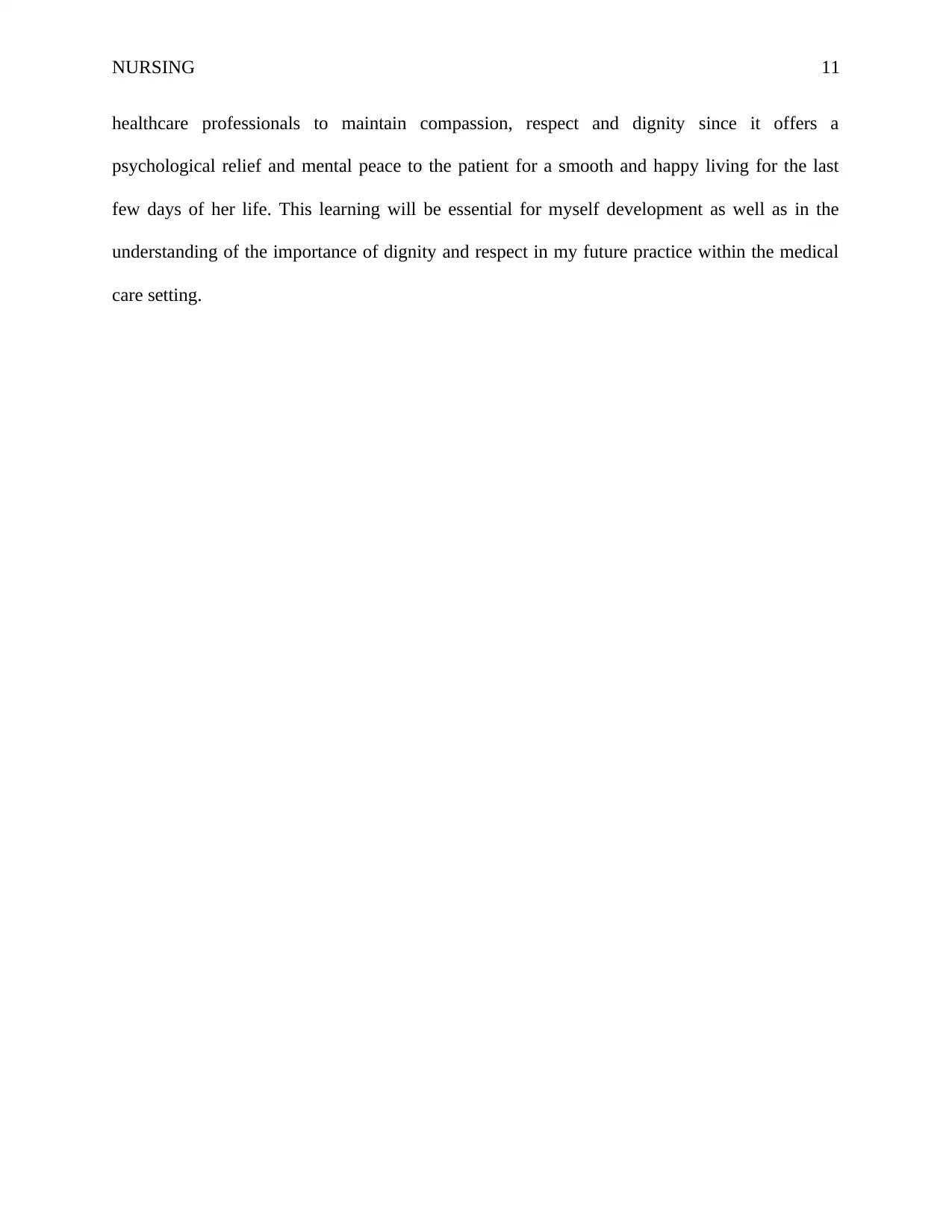
NURSING 11
healthcare professionals to maintain compassion, respect and dignity since it offers a
psychological relief and mental peace to the patient for a smooth and happy living for the last
few days of her life. This learning will be essential for myself development as well as in the
understanding of the importance of dignity and respect in my future practice within the medical
care setting.
healthcare professionals to maintain compassion, respect and dignity since it offers a
psychological relief and mental peace to the patient for a smooth and happy living for the last
few days of her life. This learning will be essential for myself development as well as in the
understanding of the importance of dignity and respect in my future practice within the medical
care setting.
⊘ This is a preview!⊘
Do you want full access?
Subscribe today to unlock all pages.

Trusted by 1+ million students worldwide
1 out of 14
Related Documents
Your All-in-One AI-Powered Toolkit for Academic Success.
+13062052269
info@desklib.com
Available 24*7 on WhatsApp / Email
![[object Object]](/_next/static/media/star-bottom.7253800d.svg)
Unlock your academic potential
Copyright © 2020–2026 A2Z Services. All Rights Reserved. Developed and managed by ZUCOL.
